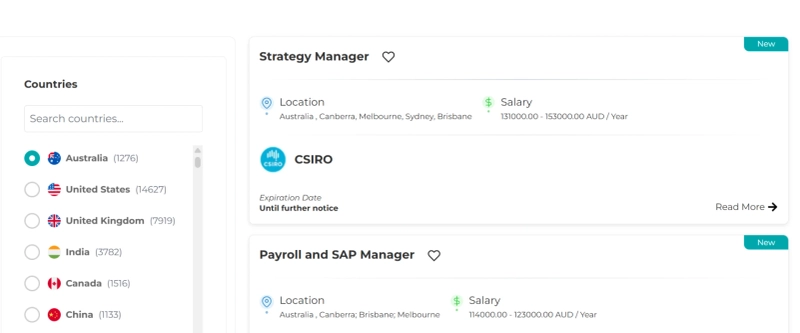The Australian construction industry is booming, offering a wealth of construction jobs across the country for both local and international workers. Whether you’re an experienced tradesperson, a civil engineer, or just starting out as a laborer, the construction sector continues to provide stable employment, excellent wages, and long-term career growth. With massive infrastructure projects, housing demands, and commercial developments ongoing in major cities like Sydney, Melbourne, Brisbane, and Perth, now is the perfect time to explore construction jobs in all of Australia.
Overview of the Construction Job Market in Australia
The construction industry in Australia is one of the country's top contributors to GDP and employment. As of 2025, the industry employs over 1.2 million workers, with consistent demand across residential, commercial, and civil sectors.
Key Sectors Hiring in Construction:
- Residential Building: Home construction, renovations, and apartment developments.
- Commercial Construction: Offices, retail spaces, educational facilities, and hospitals.
- Infrastructure Projects: Roads, bridges, railways, and public transport expansions.
- Mining & Industrial Construction: Warehouses, processing plants, and energy facilities.
With projects like the Western Sydney Airport, Brisbane’s Cross River Rail, and Melbourne’s Suburban Rail Loop underway, demand for skilled labor, supervisors, and engineers is at an all-time high.
In-Demand Construction Jobs in Australia
If you're looking to break into or move up in the construction field, here are some of the most sought-after construction jobs in Australia:
1. Construction Laborer
- Average Salary: $55,000 - $75,000 AUD/year
- Role: Assisting tradespeople, cleaning sites, loading/unloading materials
- Entry Requirements: No formal qualifications, but White Card certification is mandatory.
2. Carpenters & Joiners
- Average Salary: $70,000 - $100,000 AUD/year
- Role: Framing, cabinetry, formwork, finishing work in both residential and commercial builds
- Qualifications: Certificate III in Carpentry or apprenticeship.
3. Electricians
- Average Salary: $80,000 - $120,000 AUD/year
- Role: Electrical systems installation and maintenance
- Requirements: Electrical license (state-specific), apprenticeship, White Card
4. Plumbers
- Average Salary: $75,000 - $110,000 AUD/year
- Role: Piping, drainage, gas fitting, and water systems
- Licensing: Plumbing license plus Certificate III
5. Site Manager / Construction Supervisor
- Average Salary: $90,000 - $140,000 AUD/year
- Role: Overseeing day-to-day operations, safety, schedules, and compliance
- Skills: Leadership, time management, construction knowledge, Cert IV in Building & Construction
6. Civil Engineer / Project Engineer
- Average Salary: $100,000 - $150,000+ AUD/year
- Role: Planning, designing, and managing infrastructure projects
- Requirements: Engineering degree, registration with Engineers Australia.
Best Cities and Regions for Construction Jobs
Construction jobs are available nationwide, but certain areas are experiencing higher growth:
Sydney (NSW)
- Home to multibillion-dollar infrastructure developments and housing projects.
- High demand for skilled workers and project managers.
Melbourne (VIC)
- Growth in both high-rise residential and transport infrastructure.
- Good market for carpenters, electricians, and site managers.
Brisbane & Gold Coast (QLD)
- Civil projects such as Cross River Rail and Olympics 2032 developments.
- Growing demand for civil engineers and construction laborers.
Perth (WA)
- Driven by mining sector and housing developments.
- Opportunities for heavy machinery operators and fly-in fly-out (FIFO) workers.
Regional Australia
- Regional construction jobs offer bonuses, housing subsidies, and relocation incentives.
- High need for tradies in rural development and resource projects.
Requirements to Work in Australian Construction
To work legally in construction in Australia, you must meet a few key requirements:
1. White Card (Construction Induction Training)
- Mandatory for all workers on construction sites in Australia.
- Can be obtained through a short course online or in-person (RTOs approved by Safe Work Australia).
2. Trade License or Certification
- Essential for electricians, plumbers, builders, and certain skilled roles.
- Must be recognized by the state or territory in which you are working.
3. Work Visa (for Foreign Workers)
- Temporary Skill Shortage (TSS) Visa – Subclass 482
- Skilled Independent Visa – Subclass 189
- Working Holiday Visa – Subclass 417 (for short-term or casual jobs)
- Employers often sponsor skilled overseas workers when local labor is unavailable.
Job Boards and Agencies for Construction Jobs
Here are top platforms and recruiters for finding construction jobs in Australia:
Online Job Boards
- Seek (seek.com.au)
- Indeed (indeed.com.au)
- CareerOne (careerone.com.au)
- Crawljobs – A growing platform specializing in construction, trade, and industrial jobs across Australia.
Recruitment Agencies
- Hays Construction
- Randstad
- Design & Build Recruitment
- Core Talent
- Workforce XS
Tips to Succeed in the Australian Construction Job Market
- Get Certified Early: Make sure you obtain your White Card and any required licenses or recognition for your trade.
- Build Your Resume: Emphasize experience, safety training, and specific project types (e.g., civil, commercial).
- Network: Connect with construction companies and recruiters on LinkedIn, attend trade expos, or join unions.
- Stay Updated on Safety Standards: Australia takes OH&S (Occupational Health and Safety) very seriously.
- Consider Regional Areas: Higher pay and incentives are often offered for those willing to work in remote or rural construction sites.
Challenges and Opportunities in the Industry
Challenges:
- Labor shortages in some skilled trades
- Rising material costs
- Worksite safety and regulatory compliance
Opportunities:
- High job security and wage growth
- Pathways from laborer to supervisor to project manager
- Green construction and smart building technologies are creating new niches
Conclusion: Is a Construction Job Right for You?
If you’re looking for a career that combines physical work, problem-solving, and real-world impact, construction jobs in Australia might be your perfect fit. With strong wages, plentiful job openings, and career advancement opportunities, the industry offers a rewarding path whether you're starting out or already have years of experience.
Whether you're based in Sydney, heading to Perth, or exploring rural opportunities, Australia’s construction sector is building a bright future—and you can be part of it.


